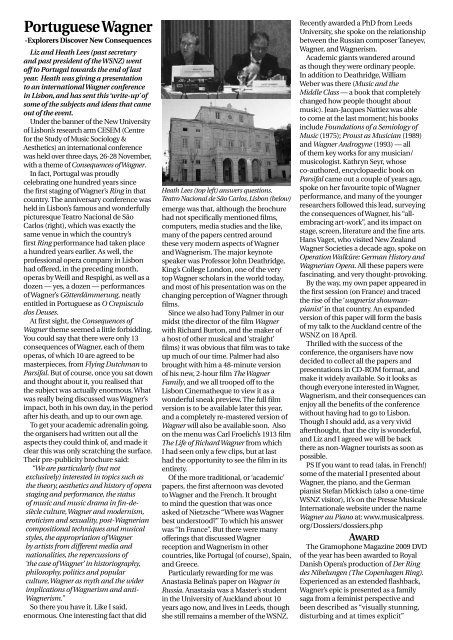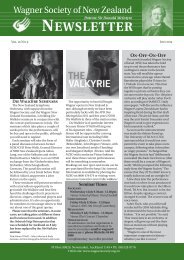NEWSLETTER - Wagner Society of New Zealand
NEWSLETTER - Wagner Society of New Zealand
NEWSLETTER - Wagner Society of New Zealand
You also want an ePaper? Increase the reach of your titles
YUMPU automatically turns print PDFs into web optimized ePapers that Google loves.
Portuguese <strong>Wagner</strong><br />
-Explorers Discover <strong>New</strong> Consequences<br />
Liz and Heath Lees (past secretary<br />
and past president <strong>of</strong> the WSNZ) went<br />
<strong>of</strong>f to Portugal towards the end <strong>of</strong> last<br />
year. Heath was giving a presentation<br />
to an international <strong>Wagner</strong> conference<br />
in Lisbon, and has sent this ‘write-up’ <strong>of</strong><br />
some <strong>of</strong> the subjects and ideas that came<br />
out <strong>of</strong> the event.<br />
Under the banner <strong>of</strong> the <strong>New</strong> University<br />
<strong>of</strong> Lisbon’s research arm CESEM (Centre<br />
for the Study <strong>of</strong> Music Sociology &<br />
Aesthetics) an international conference<br />
was held over three days, 26-28 November,<br />
with a theme <strong>of</strong> Consequences <strong>of</strong> <strong>Wagner</strong>.<br />
In fact, Portugal was proudly<br />
celebrating one hundred years since<br />
the first staging <strong>of</strong> <strong>Wagner</strong>’s Ring in that<br />
country. The anniversary conference was<br />
held in Lisbon’s famous and wonderfully<br />
picturesque Teatro Nacional de São<br />
Carlos (right), which was exactly the<br />
same venue in which the country’s<br />
first Ring performance had taken place<br />
a hundred years earlier. As well, the<br />
pr<strong>of</strong>essional opera company in Lisbon<br />
had <strong>of</strong>fered, in the preceding month,<br />
operas by Weill and Respighi, as well as a<br />
dozen — yes, a dozen — performances<br />
<strong>of</strong> <strong>Wagner</strong>’s Götterdämmerung, neatly<br />
entitled in Portuguese as O Crepúsculo<br />
dos Deuses.<br />
At first sight, the Consequences <strong>of</strong><br />
<strong>Wagner</strong> theme seemed a little forbidding.<br />
You could say that there were only 13<br />
consequences <strong>of</strong> <strong>Wagner</strong>, each <strong>of</strong> them<br />
operas, <strong>of</strong> which 10 are agreed to be<br />
masterpieces, from Flying Dutchman to<br />
Parsifal. But <strong>of</strong> course, once you sat down<br />
and thought about it, you realised that<br />
the subject was actually enormous. What<br />
was really being discussed was <strong>Wagner</strong>’s<br />
impact, both in his own day, in the period<br />
after his death, and up to our own age.<br />
To get your academic adrenalin going,<br />
the organisers had written out all the<br />
aspects they could think <strong>of</strong>, and made it<br />
clear this was only scratching the surface.<br />
Their pre-publicity brochure said:<br />
“We are particularly (but not<br />
exclusively) interested in topics such as<br />
the theory, aesthetics and history <strong>of</strong> opera<br />
staging and performance, the status<br />
<strong>of</strong> music and music drama in fin-desiècle<br />
culture, <strong>Wagner</strong> and modernism,<br />
eroticism and sexuality, post-<strong>Wagner</strong>ian<br />
compositional techniques and musical<br />
styles, the appropriation <strong>of</strong> <strong>Wagner</strong><br />
by artists from different media and<br />
nationalities, the repercussions <strong>of</strong><br />
‘the case <strong>of</strong> <strong>Wagner</strong>’ in historiography,<br />
philosophy, politics and popular<br />
culture, <strong>Wagner</strong> as myth and the wider<br />
implications <strong>of</strong> <strong>Wagner</strong>ism and anti-<br />
<strong>Wagner</strong>ism.”<br />
So there you have it. Like I said,<br />
enormous. One interesting fact that did<br />
Heath Lees (top left) answers questions.<br />
Teatro Nacional de São Carlos, Lisbon (below)<br />
emerge was that, although the brochure<br />
had not specifically mentioned films,<br />
computers, media studies and the like,<br />
many <strong>of</strong> the papers centred around<br />
these very modern aspects <strong>of</strong> <strong>Wagner</strong><br />
and <strong>Wagner</strong>ism. The major keynote<br />
speaker was Pr<strong>of</strong>essor John Deathridge,<br />
King’s College London, one <strong>of</strong> the very<br />
top <strong>Wagner</strong> scholars in the world today,<br />
and most <strong>of</strong> his presentation was on the<br />
changing perception <strong>of</strong> <strong>Wagner</strong> through<br />
films.<br />
Since we also had Tony Palmer in our<br />
midst (the director <strong>of</strong> the film <strong>Wagner</strong><br />
with Richard Burton, and the maker <strong>of</strong><br />
a host <strong>of</strong> other musical and ‘straight’<br />
films) it was obvious that film was to take<br />
up much <strong>of</strong> our time. Palmer had also<br />
brought with him a 48-minute version<br />
<strong>of</strong> his new, 2-hour film The <strong>Wagner</strong><br />
Family, and we all trooped <strong>of</strong>f to the<br />
Lisbon Cinematheque to view it as a<br />
wonderful sneak preview. The full film<br />
version is to be available later this year,<br />
and a completely re-mastered version <strong>of</strong><br />
<strong>Wagner</strong> will also be available soon. Also<br />
on the menu was Carl Froelich’s 1913 film<br />
The Life <strong>of</strong> Richard <strong>Wagner</strong> from which<br />
I had seen only a few clips, but at last<br />
had the opportunity to see the film in its<br />
entirety.<br />
Of the more traditional, or ‘academic’<br />
papers, the first afternoon was devoted<br />
to <strong>Wagner</strong> and the French. It brought<br />
to mind the question that was once<br />
asked <strong>of</strong> Nietzsche “Where was <strong>Wagner</strong><br />
best understood?” To which his answer<br />
was “In France”. But there were many<br />
<strong>of</strong>ferings that discussed <strong>Wagner</strong><br />
reception and <strong>Wagner</strong>ism in other<br />
countries, like Portugal (<strong>of</strong> course), Spain,<br />
and Greece.<br />
Particularly rewarding for me was<br />
Anastasia Belina’s paper on <strong>Wagner</strong> in<br />
Russia. Anastasia was a Master’s student<br />
in the University <strong>of</strong> Auckland about 10<br />
years ago now, and lives in Leeds, though<br />
she still remains a member <strong>of</strong> the WSNZ.<br />
Recently awarded a PhD from Leeds<br />
University, she spoke on the relationship<br />
between the Russian composer Taneyev,<br />
<strong>Wagner</strong>, and <strong>Wagner</strong>ism.<br />
Academic giants wandered around<br />
as though they were ordinary people.<br />
In addition to Deathridge, William<br />
Weber was there (Music and the<br />
Middle Class — a book that completely<br />
changed how people thought about<br />
music). Jean-Jacques Nattiez was able<br />
to come at the last moment; his books<br />
include Foundations <strong>of</strong> a Semiology <strong>of</strong><br />
Music (1975); Proust as Musician (1989)<br />
and <strong>Wagner</strong> Androgyne (1993) — all<br />
<strong>of</strong> them key works for any musician/<br />
musicologist. Kathryn Seyr, whose<br />
co-authored, encyclopaedic book on<br />
Parsifal came out a couple <strong>of</strong> years ago,<br />
spoke on her favourite topic <strong>of</strong> <strong>Wagner</strong><br />
performance, and many <strong>of</strong> the younger<br />
researchers followed this lead, surveying<br />
the consequences <strong>of</strong> <strong>Wagner</strong>, his “allembracing<br />
art-work”, and its impact on<br />
stage, screen, literature and the fine arts.<br />
Hans Vaget, who visited <strong>New</strong> <strong>Zealand</strong><br />
<strong>Wagner</strong> Societies a decade ago, spoke on<br />
Operation Walküre: German History and<br />
<strong>Wagner</strong>ian Opera. All these papers were<br />
fascinating, and very thought-provoking.<br />
By the way, my own paper appeared in<br />
the first session (on France) and traced<br />
the rise <strong>of</strong> the ‘wagnerist showmanpianist’<br />
in that country. An expanded<br />
version <strong>of</strong> this paper will form the basis<br />
<strong>of</strong> my talk to the Auckland centre <strong>of</strong> the<br />
WSNZ on 18 April.<br />
Thrilled with the success <strong>of</strong> the<br />
conference, the organisers have now<br />
decided to collect all the papers and<br />
presentations in CD-ROM format, and<br />
make it widely available. So it looks as<br />
though everyone interested in <strong>Wagner</strong>,<br />
<strong>Wagner</strong>ism, and their consequences can<br />
enjoy all the benefits <strong>of</strong> the conference<br />
without having had to go to Lisbon.<br />
Though I should add, as a very vivid<br />
afterthought, that the city is wonderful,<br />
and Liz and I agreed we will be back<br />
there as non-<strong>Wagner</strong> tourists as soon as<br />
possible.<br />
PS If you want to read (alas, in French!)<br />
some <strong>of</strong> the material I presented about<br />
<strong>Wagner</strong>, the piano, and the German<br />
pianist Stefan Mickisch (also a one-time<br />
WSNZ visitor), it’s on the Presse Musicale<br />
Internationale website under the name<br />
<strong>Wagner</strong> au Piano at: www.musicalpress.<br />
org/Dossiers/dossiers.php<br />
Award<br />
The Gramophone Magazine 2009 DVD<br />
<strong>of</strong> the year has been awarded to Royal<br />
Danish Opera’s production <strong>of</strong> Der Ring<br />
des Nibelungen (The Copenhagen Ring).<br />
Experienced as an extended flashback,<br />
<strong>Wagner</strong>’s epic is presented as a family<br />
saga from a feminist perspective and<br />
been described as “visually stunning,<br />
disturbing and at times explicit”



